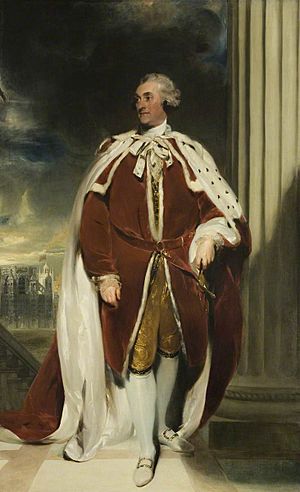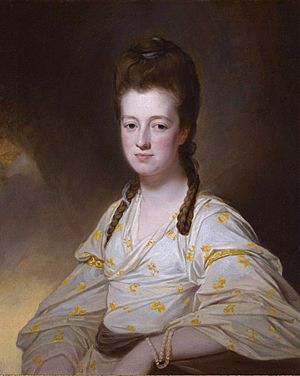William Cavendish-Bentinck, 3rd Duke of Portland facts for kids
Quick facts for kids
The Duke of Portland
|
|
|---|---|

Portrait by Thomas Lawrence c. 1792
|
|
| Prime Minister of the United Kingdom | |
| In office 31 March 1807 – 4 October 1809 |
|
| Monarch | George III |
| Preceded by | The Lord Grenville |
| Succeeded by | Spencer Perceval |
| Prime Minister of Great Britain | |
| In office 2 April 1783 – 18 December 1783 |
|
| Monarch | George III |
| Preceded by | The Earl of Shelburne |
| Succeeded by | William Pitt the Younger |
| Lord President of the Council | |
| In office 30 July 1801 – 14 January 1805 |
|
| Prime Minister | Henry Addington William Pitt the Younger |
| Preceded by | The Earl of Chatham |
| Succeeded by | The Viscount Sidmouth |
| Home Secretary | |
| In office 11 July 1794 – 30 July 1801 |
|
| Prime Minister | William Pitt the Younger |
| Preceded by | Henry Dundas |
| Succeeded by | Lord Pelham |
| Leader of the House of Lords | |
| In office 2 April 1783 – 18 December 1783 |
|
| Prime Minister | Himself |
| Preceded by | The Earl of Shelburne |
| Succeeded by | The Earl Temple |
| Lord Lieutenant of Ireland | |
| In office 8 April 1782 – 15 August 1782 |
|
| Prime Minister | The Earl of Shelburne |
| Preceded by | The Earl of Carlisle |
| Succeeded by | The Earl Temple |
| Lord Chamberlain of the Household | |
| In office 1765–1766 |
|
| Monarch | George III |
| Preceded by | The Earl Gower |
| Succeeded by | The Earl of Hertford |
| Personal details | |
| Born | 14 April 1738 Nottinghamshire, England |
| Died | 30 October 1809 (aged 71) Westminster, England |
| Resting place | St Marylebone Parish Church |
| Political party | |
| Spouse | |
| Children | 6, including William, 4th Duke; Lord William and Lord Charles |
| Parents | |
| Alma mater | Christ Church, Oxford |
| Signature |  |
William Henry Cavendish Cavendish-Bentinck, 3rd Duke of Portland (born April 14, 1738, died October 30, 1809) was an important British politician. He served as the Prime Minister of Great Britain and later the United Kingdom twice. The time between his two terms as Prime Minister was 26 years, which is the longest gap for any British Prime Minister.
He was known as the Marquess of Titchfield before 1762. He held many noble titles, including duke, marquess, earl, viscount, and baron. He led a group of politicians called the Portland Whigs. This group joined forces with William Pitt the Younger after the French Revolution.
Contents
Early Life and Education
William was the oldest son of William Bentinck, 2nd Duke of Portland and Margaret Cavendish-Harley. He inherited a lot of land from his mother and grandmother.
He went to Westminster School and then to Christ Church, Oxford university. He earned his Master of Arts degree in 1757.
Family Life
On November 8, 1766, William married Lady Dorothy Cavendish. She was the daughter of William Cavendish, 4th Duke of Devonshire.
They had six children together:
- William Bentinck, 4th Duke of Portland (born 1768, died 1854).
- Lord William Henry Cavendish-Bentinck (born 1774, died 1839).
- Lady Charlotte Cavendish-Bentinck (born 1775, died 1862). She married Charles Greville.
- Lady Mary Cavendish-Bentinck (born 1779, died 1843).
- Lord Charles Bentinck (born 1780, died 1826). He was an ancestor of later Dukes of Portland.
- Lord Frederick Cavendish-Bentinck (born 1781, died 1828). He was also an ancestor of later Dukes of Portland.
Important Political Roles
In 1761, William was elected to the Parliament of Great Britain. The next year, he became the Duke of Portland after his father passed away. This meant he joined the House of Lords. He was part of the Whig Party led by Lord Rockingham. He served as Lord Chamberlain of the Household from 1765 to 1766.
Serving in Ireland
From April to August 1782, Portland served as the Lord Lieutenant of Ireland. This role was like a governor for Ireland. At the time, there were strong demands for changes in Ireland. People wanted less control and taxation from the British government.
Portland decided to make some agreements. He convinced Parliament to change laws that had been unfair to Ireland. After Lord Rockingham died, Portland resigned from his role.
First Time as Prime Minister
In April 1783, Portland became Prime Minister. He led a government that included Charles James Fox and Lord North. He was the First Lord of the Treasury until his government ended in December of that year.
During his time as Prime Minister, the Treaty of Paris was signed. This treaty officially ended the American Revolutionary War. His government fell when a plan to change the East India Company was voted down. King George III did not support the plan.
In 1789, Portland became a leader at London's Foundling Hospital. This charity helped abandoned children in London. His father had been one of the first governors of the hospital. In 1793, Portland became the president of the charity.
Helping the Home Front
Portland was worried about the French Revolution. Because of this, he disagreed with Charles James Fox. He then joined the government of William Pitt the Younger in 1794. He became the Secretary of State for the Home Department.
In this role, he helped manage the government's work at home. He also helped pass the Act of Union 1800. This act joined Great Britain and Ireland into the United Kingdom. He stayed in the government until Pitt died in 1806.
Second Time as Prime Minister
In March 1807, Portland became Prime Minister again. He led a group of ministers that included important figures like George Canning and Lord Castlereagh.
During his second term, the United Kingdom faced challenges in Europe. However, it also marked the start of the Peninsular War. This war helped Britain begin to recover. In late 1809, Portland's health was poor. His government also faced problems, including a famous duel between Canning and Castlereagh. Portland resigned and died shortly after.
Later Life and Legacy
William Cavendish-Bentinck died on October 30, 1809, in London. He was buried at St Marylebone Parish Church.
Many places and things are named after him or his family:
- The famous Portland Vase of Roman glass was named because he owned it.
- Portland Parish, in Jamaica, was named after him. The Titchfield School there, founded in 1786, is also named in his honor.
- Two main streets in Marylebone, London, are named after him: Portland Place and Great Portland Street. He once owned the land where they were built.
- North Bentinck Arm and South Bentinck Arm in British Columbia, Canada, were named for the Bentinck family. This was done by George Vancouver in 1793.
- Portland Bay in Victoria, Australia, was named in 1800 by British explorer James Grant. The city of Portland is located on this bay.
His personal and political papers are kept at the Manuscripts and Special Collections, The University of Nottingham. The Portland Collection of art also includes pieces he owned.
Images for kids
-
Memorial to the 3rd Duke of Portland at the family vault in St Marylebone Parish Church
See also
 In Spanish: William Henry Cavendish-Bentinck para niños
In Spanish: William Henry Cavendish-Bentinck para niños
 | Calvin Brent |
 | Walter T. Bailey |
 | Martha Cassell Thompson |
 | Alberta Jeannette Cassell |



